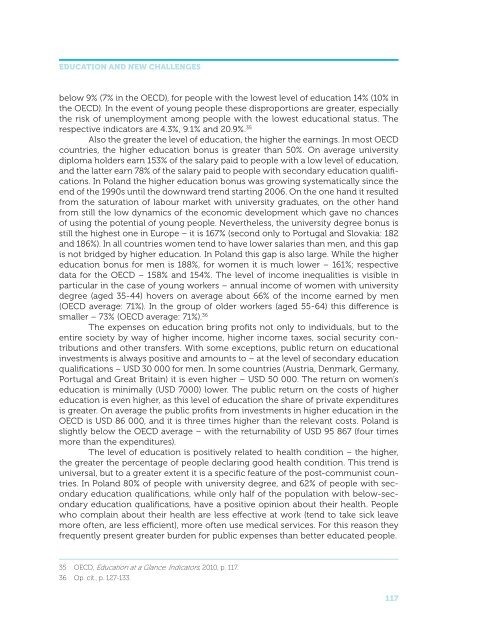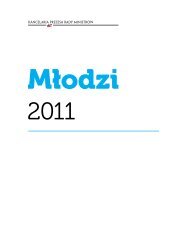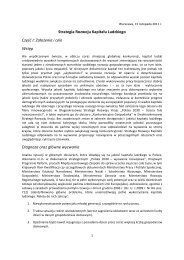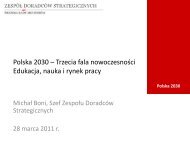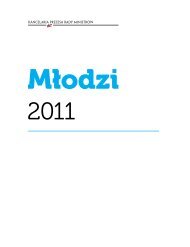Education and new challenges - Raport Polska 2030
Education and new challenges - Raport Polska 2030
Education and new challenges - Raport Polska 2030
Create successful ePaper yourself
Turn your PDF publications into a flip-book with our unique Google optimized e-Paper software.
<strong>Education</strong> <strong>and</strong> <strong>new</strong> <strong>challenges</strong><br />
below 9% (7% in the OECD), for people with the lowest level of education 14% (10% in<br />
the OECD). In the event of young people these disproportions are greater, especially<br />
the risk of unemployment among people with the lowest educational status. The<br />
respective indicators are 4.3%, 9.1% <strong>and</strong> 20.9%. 35<br />
Also the greater the level of education, the higher the earnings. In most OECD<br />
countries, the higher education bonus is greater than 50%. On average university<br />
diploma holders earn 153% of the salary paid to people with a low level of education,<br />
<strong>and</strong> the latter earn 78% of the salary paid to people with secondary education qualifications.<br />
In Pol<strong>and</strong> the higher education bonus was growing systematically since the<br />
end of the 1990s until the downward trend starting 2006. On the one h<strong>and</strong> it resulted<br />
from the saturation of labour market with university graduates, on the other h<strong>and</strong><br />
from still the low dynamics of the economic development which gave no chances<br />
of using the potential of young people. Nevertheless, the university degree bonus is<br />
still the highest one in Europe – it is 167% (second only to Portugal <strong>and</strong> Slovakia: 182<br />
<strong>and</strong> 186%). In all countries women tend to have lower salaries than men, <strong>and</strong> this gap<br />
is not bridged by higher education. In Pol<strong>and</strong> this gap is also large. While the higher<br />
education bonus for men is 188%, for women it is much lower – 161%; respective<br />
data for the OECD – 158% <strong>and</strong> 154%. The level of income inequalities is visible in<br />
particular in the case of young workers – annual income of women with university<br />
degree (aged 35-44) hovers on average about 66% of the income earned by men<br />
(OECD average: 71%). In the group of older workers (aged 55-64) this difference is<br />
smaller – 73% (OECD average: 71%). 36<br />
The expenses on education bring profits not only to individuals, but to the<br />
entire society by way of higher income, higher income taxes, social security contributions<br />
<strong>and</strong> other transfers. With some exceptions, public return on educational<br />
investments is always positive <strong>and</strong> amounts to – at the level of secondary education<br />
qualifications – USD 30 000 for men. In some countries (Austria, Denmark, Germany,<br />
Portugal <strong>and</strong> Great Britain) it is even higher – USD 50 000. The return on women’s<br />
education is minimally (USD 7000) lower. The public return on the costs of higher<br />
education is even higher, as this level of education the share of private expenditures<br />
is greater. On average the public profits from investments in higher education in the<br />
OECD is USD 86 000, <strong>and</strong> it is three times higher than the relevant costs. Pol<strong>and</strong> is<br />
slightly below the OECD average – with the returnability of USD 95 867 (four times<br />
more than the expenditures).<br />
The level of education is positively related to health condition – the higher,<br />
the greater the percentage of people declaring good health condition. This trend is<br />
universal, but to a greater extent it is a specific feature of the post-communist countries.<br />
In Pol<strong>and</strong> 80% of people with university degree, <strong>and</strong> 62% of people with secondary<br />
education qualifications, while only half of the population with below-secondary<br />
education qualifications, have a positive opinion about their health. People<br />
who complain about their health are less effective at work (tend to take sick leave<br />
more often, are less efficient), more often use medical services. For this reason they<br />
frequently present greater burden for public expenses than better educated people.<br />
35 OECD, <strong>Education</strong> at a Glance. Indicators, 2010, p. 117.<br />
36 Op. cit., p. 127-133.<br />
117


